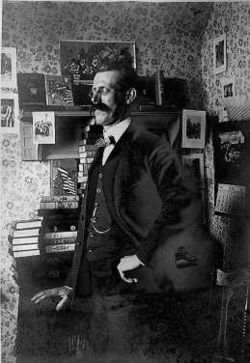
Excerpt from Young Captain Jack: Or the Son of a Soldier Young captain jack relates the adven tures of a boy waif, who is cast upon the Atlantic shore of one of our Southern States and taken into one of the leading families of the locality. The youth grows up as a member of the family, know ing little or nothing of his past. This is at the time of the Civil War, when the locality is in constant agitation, fearing that a battle will be fought in the immediate vicinity. During this time there appears upon the scene a Confederate surgeon who, for reasons of his own, claims Jack as his son. The youth has had trouble with this man and despises him. He cannot make himself be lieve that the surgeon is his parent and he refuses 0 to leave his foster mother, who thinks the world of him. Many complications arise, but in the end the truth concerning the youth's identity is un covered, and all ends happily for the young son of a soldier.
Authors

Horatio Alger, Jr. (January 13, 1832 – July 18, 1899) was a prolific 19th-century American author, most famous for his novels following the adventures of bootblacks, newsboys, peddlers, buskers, and other impoverished children in their rise from humble backgrounds to lives of respectable middle-class security and comfort. His novels about boys who succeed under the tutelage of older mentors were hugely popular in their day. Born in Chelsea, Massachusetts, the son of a Unitarian minister, Alger entered Harvard University at the age of sixteen. Following graduation, he briefly worked in education before touring Europe for almost a year. He then entered the Harvard Divinity School, and, in 1864, took a position at a Unitarian church in Brewster, Massachusetts. Two years later, he resigned following allegations he had sexual relations with two teenage boys.[1] He retired from the ministry and moved to New York City where he formed an association with the Newsboys Lodging House and other agencies offering aid to impoverished children. His sympathy for the working boys of the city, coupled with the moral values learned at home, were the basis of his many juvenile rags to riches novels illustrating how down-and-out boys might be able to achieve the American Dream of wealth and success through hard work, courage, determination, and concern for others. This widely held view involves Alger's characters achieving extreme wealth and the subsequent remediation of their "old ghosts." Alger is noted as a significant figure in the history of American cultural and social ideals. He died in 1899. The first full-length Alger biography was commissioned in 1927 and published in 1928, and along with many others that borrowed from it later proved to be heavily fictionalized parodies perpetuating hoaxes and made up anecdotes that "would resemble the tell-all scandal biographies of the time."[2] Other biographies followed, sometimes citing the 1928 hoax as fact. In the last decades of the twentieth century a few more reliable biographies were published that attempt to correct the errors and fictionalizations of the past.

Edward Stratemeyer (1862-1930) was an American publisher and writer of children's fiction. He was one of the most prolific writers in the world, producing in excess of 1,300 books himself, selling in excess of 500 million copies. He also created many well-known fictional book series for juveniles, including The Rover Boys, The Bobbsey Twins, Tom Swift, The Hardy Boys, and Nancy Drew series, many of which sold millions of copies and are still in publication today. In the early 1880s he began writing shorts after the style of Horatio Alger under several pseudonyms, mainly using the pen names "Arthur M. Winfield" "Allen Chapman", and "Capt. Ralph Bonehill." Stratemeyer formed the Stratemeyer Literary Syndicate in 1905 and hired journalists to write stories based on his ideas. He paid them a flat rate for each book and kept the copyrights to the novels.